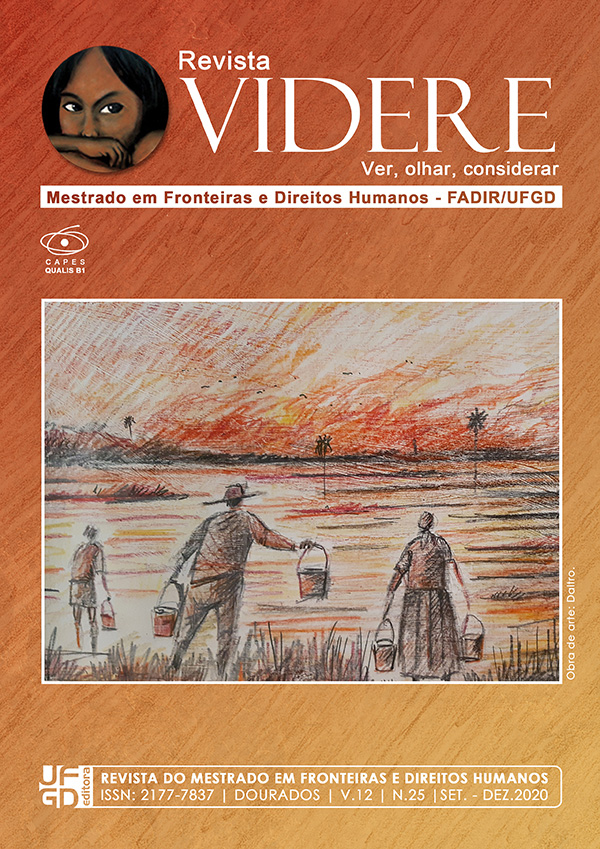Enquanto no Brasil pais buscam seus direitos sobre a inclusão escolar no Ministério Público, na Europa não precisam litigar
DOI:
https://doi.org/10.30612/videre.v12i25.13312Palavras-chave:
Direitos humanos. Políticas públicas educacionais. Inclusão escolar. Necessidades educativas especiais.Resumo
Este artigo é uma análise sobre a legislação brasileira no que tange os direitos dos alunos com Necessidades Educativas Especiais - NEE, de forma mais específica na busca pelo professor de apoio. Como cidadãos, temos Direitos Humanos adquiridos conforme a legislação e de acordo com as Políticas Públicas Educacionais, mas na prática, alguns pais precisam recorrer à justiça para terem os seus direitos atendidos. Os documentos analisados nesta investigação se referem a um estudo de caso de uma aluna com o diagnóstico da Síndrome do X Frágil e do Transtorno do Espectro Autista - TEA. A metodologia utilizada foi um estudo de caso, com a análise do discurso, numa investigação qualitativa e interpretativa sobre os dados obtidos. A pergunta norteadora desta investigação é: “Por que as famílias brasileiras precisam recorrer ao Ministério Público em busca de direitos adquiridos, enquanto na Europa não nos deparamos com a mesma situação?”.Downloads
Referências
Ainscow, M., Booth, T. y Dyson, A. (2006). Improving schools, developing inclusion. Londres: Routledge.
Brasil. Lei Brasileira de Inclusão da Pessoa com Deficiência, Lei nº 13.146 de 06 de julho de 2015.
Brasil. Política Nacional de Proteção dos Direitos da Pessoa com Transtorno do Espectro Autista. Lei n. 12.764, de 27 de dezembro de 2012.
Brasil. Institui a Política Estadual de Proteção dos Direitos da Pessoa com Síndrome do X Frágil. Lei Nº 17.681, de 17 de setembro de 2013.
Dessen, M. A. & Polonia, A. C. (2007). A Família e a Escola como contextos de desenvolvimento humano. Disponível em www.scielo.br/paideia
Erickson, F. (1986). Qualitative methods in research on teaching. In M. C. Wittrock (Ed.), Handbook of research on teaching. Pp. 119-161. Nova Iorque: MacMillan.
Guerra, I. C.(2006). Pesquisa Qualitativa e Análise de Conteúdo. Lisboa: Principia.
Flick, U. (2004). Uma introdução à pesquisa qualitativa. 2. Ed. Porto Alegre: Bookman.
Miranda, M. G. (1989). Psicologia Social. O homem em movimento. 8ª edição. Ed. Brasiliense, São Paulo
Molina, R. e Dias, E. (2003). Iniciação em pesquisa científica: Manual para profissionais e estudantes das áreas da saúde, ciências biológicas e humanas. Edupe.
ONU; UNESCO. (2006) Plan de Acción: Programa Mundial para La Educación em Derechos Humanos - Primera etapa. Nueva York y Genebra, 61.
Pando Ballesteros, Mª Paz; Muñoz Ramírez, Alicia y Garrido Rodríguez, Pedro (dirs. y eds.) (2016): Pasado y Presente de los Derechos Humanos. Mirando al Futuro. Ed. Los Libros de la Catarata. Madrid
Pinto, A. V. (1989) Ciência e existência problemas filosóficos da pesquisa científica. 2a Ed. Rio de Janeiro: Paz e Terra.
Pujolás, P. (2006). Aulas inclusivas y aprendizaje cooperativo. A tu Salud, 55, Pp. 20-27.
Saviani, D. (2003) Pedagogia histórico-crítica: primeiras aproximações. Campinas, SP: Autores Associados.
Saviani, D. (2005). Pedagogia hisórico-crítica: primeiras aproximações. São Paulo: Autores associados.
UNESCO (1999). Los siete saberes necessários para la educación del futuro. Madrid: Santillana.
Yin. R. K. (2005) Estudo de caso: planejamento e métodos. 3ª Ed., Porto Alegre: Bookman.
Downloads
Publicado
Como Citar
Edição
Seção
Licença
Os autores devem aceitar as normas de publicação ao submeterem a revista, bem como, concordam com os seguintes termos:
(a) O Conselho Editorial se reserva ao direito de efetuar, nos originais, alterações da Língua portuguesa para se manter o padrão culto da língua, respeitando, porém, o estilo dos autores.
(b) Autores mantém os direitos autorais e concedem à revista o direito de primeira publicação, com o trabalho simultaneamente licenciado sob a Atribuição-NãoComercial-CompartilhaIgual 3.0 Brasil (CC BY-NC-SA 3.0 BR) que permite: Compartilhar — copiar e redistribuir o material em qualquer suporte ou formato e Adaptar — remixar, transformar, e criar a partir do material. A CC BY-NC-SA 3.0 BR considera os termos seguintes:
- Atribuição — Você deve dar o crédito apropriado, prover um link para a licença e indicar se mudanças foram feitas. Você deve fazê-lo em qualquer circunstância razoável, mas de nenhuma maneira que sugira que o licenciante apoia você ou o seu uso.
- NãoComercial — Você não pode usar o material para fins comerciais.
- CompartilhaIgual — Se você remixar, transformar, ou criar a partir do material, tem de distribuir as suas contribuições sob a mesma licença que o original.
- Sem restrições adicionais — Você não pode aplicar termos jurídicos ou medidas de caráter tecnológico que restrinjam legalmente outros de fazerem algo que a licença permita.



















